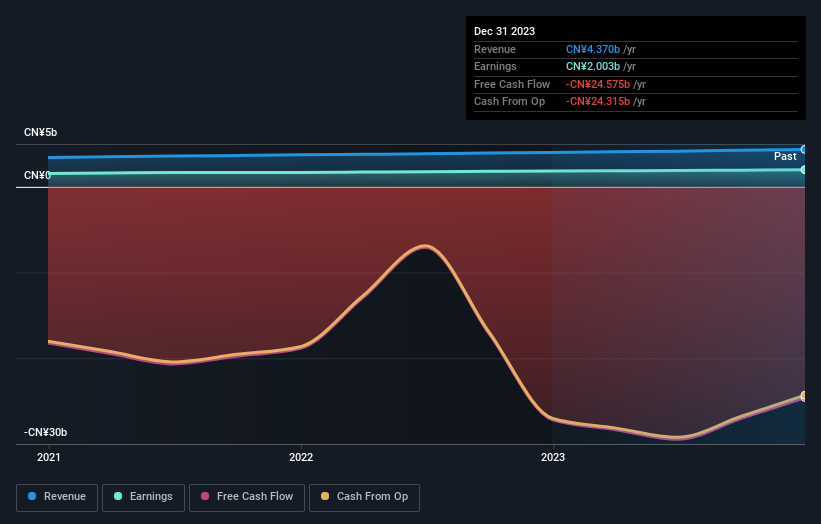Private companies invested in Jinshang Bank Co., Ltd. (HKG:2558) copped the brunt of last week's HK$409m market cap decline

Key Insights
- The considerable ownership by private companies in Jinshang Bank indicates that they collectively have a greater say in management and business strategy
- The top 4 shareholders own 50% of the company
- 15% of Jinshang Bank is held by Institutions
Every investor in Jinshang Bank Co., Ltd. (HKG:2558) should be aware of the most powerful shareholder groups. We can see that private companies own the lion's share in the company with 56% ownership. In other words, the group stands to gain the most (or lose the most) from their investment into the company.
As a result, private companies as a group endured the highest losses last week after market cap fell by HK$409m.
Let's take a closer look to see what the different types of shareholders can tell us about Jinshang Bank.
Check out our latest analysis for Jinshang Bank

What Does The Institutional Ownership Tell Us About Jinshang Bank?
Many institutions measure their performance against an index that approximates the local market. So they usually pay more attention to companies that are included in major indices.
Jinshang Bank already has institutions on the share registry. Indeed, they own a respectable stake in the company. This implies the analysts working for those institutions have looked at the stock and they like it. But just like anyone else, they could be wrong. If multiple institutions change their view on a stock at the same time, you could see the share price drop fast. It's therefore worth looking at Jinshang Bank's earnings history below. Of course, the future is what really matters.

Hedge funds don't have many shares in Jinshang Bank. Shanxi State-owned Capital Operation Co., Ltd. is currently the company's largest shareholder with 20% of shares outstanding. For context, the second largest shareholder holds about 12% of the shares outstanding, followed by an ownership of 10% by the third-largest shareholder.
Our research also brought to light the fact that roughly 50% of the company is controlled by the top 4 shareholders suggesting that these owners wield significant influence on the business.
Researching institutional ownership is a good way to gauge and filter a stock's expected performance. The same can be achieved by studying analyst sentiments. We're not picking up on any analyst coverage of the stock at the moment, so the company is unlikely to be widely held.
Insider Ownership Of Jinshang Bank
The definition of an insider can differ slightly between different countries, but members of the board of directors always count. The company management answer to the board and the latter should represent the interests of shareholders. Notably, sometimes top-level managers are on the board themselves.
Insider ownership is positive when it signals leadership are thinking like the true owners of the company. However, high insider ownership can also give immense power to a small group within the company. This can be negative in some circumstances.
We note our data does not show any board members holding shares, personally. It is unusual not to have at least some personal holdings by board members, so our data might be flawed. A good next step would be to take a look at this free summary of insider buying and selling.
General Public Ownership
The general public-- including retail investors -- own 29% stake in the company, and hence can't easily be ignored. While this size of ownership may not be enough to sway a policy decision in their favour, they can still make a collective impact on company policies.
Private Company Ownership
Our data indicates that Private Companies hold 56%, of the company's shares. Private companies may be related parties. Sometimes insiders have an interest in a public company through a holding in a private company, rather than in their own capacity as an individual. While it's hard to draw any broad stroke conclusions, it is worth noting as an area for further research.
Next Steps:
I find it very interesting to look at who exactly owns a company. But to truly gain insight, we need to consider other information, too. Consider for instance, the ever-present spectre of investment risk. We've identified 1 warning sign with Jinshang Bank , and understanding them should be part of your investment process.
Of course, you might find a fantastic investment by looking elsewhere. So take a peek at this free list of interesting companies.
NB: Figures in this article are calculated using data from the last twelve months, which refer to the 12-month period ending on the last date of the month the financial statement is dated. This may not be consistent with full year annual report figures.
New: Manage All Your Stock Portfolios in One Place
We've created the ultimate portfolio companion for stock investors, and it's free.
• Connect an unlimited number of Portfolios and see your total in one currency
• Be alerted to new Warning Signs or Risks via email or mobile
• Track the Fair Value of your stocks
Have feedback on this article? Concerned about the content? Get in touch with us directly. Alternatively, email editorial-team (at) simplywallst.com.
This article by Simply Wall St is general in nature. We provide commentary based on historical data and analyst forecasts only using an unbiased methodology and our articles are not intended to be financial advice. It does not constitute a recommendation to buy or sell any stock, and does not take account of your objectives, or your financial situation. We aim to bring you long-term focused analysis driven by fundamental data. Note that our analysis may not factor in the latest price-sensitive company announcements or qualitative material. Simply Wall St has no position in any stocks mentioned.
About SEHK:2558
Flawless balance sheet with solid track record.

